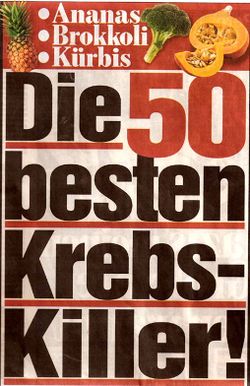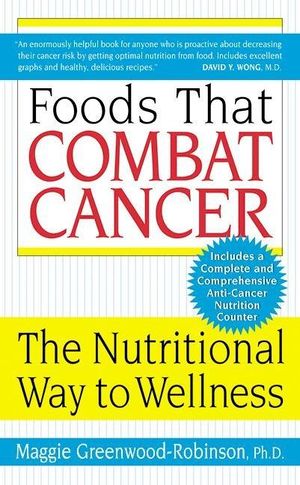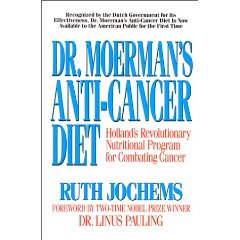Cancer Diet

A cancer diet is a way of alimentation or diet intended to heal or cure a cancer disease in a causal way or to prolong survival time. A wider understanding of the term "cancer diet" includes also a diet intended to improve quality of life of cancer patients without affecting prognosis.
So far, specific cancer diets are not accepted in scientific medicine, and are common in an alternative medicine environment. However, most cancer patients choose also concomitand alternative therapies in a complementary way to an effective therapy.
Specific cancer diets are nutritional recommendations going beyond generic recommendations and include usually unusual components, for instance the intake of herbal substances or the prohibition of a particular way of alimentation or particular substances. The recommandations found (in books or the internet) are commonly backed only by theoretical considerations. and usually lacking any scientific proof or literature.
In general, almost every cancer diet is claimed to be effective in a preventive way and at the same time also in a curative way. Cancer - prevention and cure are often confused or mixed. However, a common cancer patient is much les interested in prevention of a possible future (different) cancer disease, but seeks healing or relief of his present state. Most cancer patients are aware that a chemotherapy or radiation therapy may trigger a future cancer.
Common cancer diet models
Common explanations for cancer diets are:
- an alleged detoxification of usually not specified "toxins" or "waste".
- strengthening of the immune system
- famishment of cancer cells (see Breuß-cure) oder seletivly intoxification of cancer cells
- recommendations in accordance with the Warburg-effect of energy metabolism (examples: Budwig-diet or Coy-diet)
Known cancer diets
- anthroposophic cancer diet according to Renzenbrink. Eine Vollwertkost, jedoch ohne Nachtschattengewächse (Tomaten, Kartoffeln). Developped by German physician Udo Renzenbrink (1913-1994)
- Breuß-cure: six weeks only Sechs Wochen lang ausschließlich Gemüsesäfte (Karotten, Sellerie, Kartoffeln, Rettich) und bestimmte Tees. Developped by austrian farmer and "Heilpraktiker" Rudolf Breuß (1899-1990)
- Gerson-diet: Coffee enema, Abführmittel, Leberextrakte, Iod, Vitamine, Pepsin. Wenig Eiweiß, Zucker, Salz.
- Howard Hay diet: Eiweiße und Kohlenhydrate streng getrennt.
- Instinctotherapy according to Guy Claude Burger: Keinerlei gekochte oder gebratene Speisen, auch Fleisch und Fisch dürfen nur roh gegessen werden.
- Isopathic Milchsäurendiät oder Schutzkost nach Johannes Kuhl: Rechtsdrehende Milchsäure.
- Krebsdiät nach Ernst Leupold: Extrem kohlenhydratarme Kost, Infusionen mit Zucker und Insulin. Kein Obst außer Zitronen.
- [[Macrobiotics|Macrobiotic diet according to Kushi-Ohsawa und Schülern: Vorwiegend Getreideprodukte, verstärkt grüne blanchierte Blätter und 100% Weglassung aller sogenannter "yinniger Nachrungsmittel".
- Moerman diet accordinf to Cornelius Moerman: Vollwertkost sowie Jod, Zitronensäure, Hefe, Weizen, Schwefel und Vitamine.
- Öl-Eiweißkost accordinf to Johanna Budwig: Leinsamen- und Nussöl, Sauerkrautsaft, Gemüse- und Obstsäfte.
- Cancer diet according to Catherine Kousmine: Getreide und Rohkost, kein Fleisch.
- Hirneise 3E-program: Entwickelt von dem ehemaligen Krankenpfleger Lothar Hirneise.
- Vollwertkost nach Maximilian Bircher-Benner: Wenig Fett, viel Gemüse und Getreide, Milchprodukte, Obst, Fisch statt Fleisch.
- Kelley-Gonzalez-therapy.
- Seeger 10-Way-therapy.
- Coy diet
criticism
The different cancer diets are differing a lot and are contradicting to each other. Alleged preventing effects are often mixed with a possible curative approach.
No specific cancer diet has been accepted by evidence based medicine so far. To the contrary: a one-sided and limiting diet (as macrobiotics in its extreme form) may be harmful and cause nutritional deficits and may increase weight loose.
literature
- Kasper H, Bartram P, Scheppach W (1992) Tumorentstehung - hemmende und fördernde Effekte von Ernährungsfaktoren. In: Deutsche Gesellschaft für Ernährung (Hrsg) Ernährungsbericht 1992. Frankfurt: Eigenverlag, S. 251-286
- Dötsch R (1994) Die Bewertung von Außenseitermethoden (”Krebsdiäten”) in der Onkologie. Akt Ernähr-Med 19: 322
- Ollenschläger. Welchen Nutzen haben sogenannte "Krebsdiäten" ? Der informierte Arzt - Gazette Médicale 1996; 17: 213-220 [www.ollenschlaeger.net]
- Jungi WF (1986) Krebsdiäten. In: Jungi WF, Senn HJ (Hrsg) Krebs und Alternativmedizin. Aktuelle Onkologie, Bd. 32. München: Zuckschwerdt Verlag, S: 284-294
- Kasper H (1991) Tumordiät - Fakt oder Phantasie. In: Schauder P (Hrsg) Ernährung und Tumorerkrankungen. Basel: Karger, S. 440-453
- Halliwell B (1994) Free radicals, antioxidants and human disease: curiosity, cause, or consequence. Lancet 344: 721-724
- Bitsch R, Sinnhuber, Oberritter H, Großklaus R, Müller MJ, Wolfram G (1994) Alternative Diäten - Wunderdiäten? Akt Ernähr-Med 19: 195-211
- Birkhan B (1993) Unkonventionelle Konzepte in der Diätetik. In: Oepen I (Hrsg) Unkonventionelle medizinische Verfahren. Stuttgart: Gustav Fischer, S. 221-241
- Strube H (1995) Außenseiterdiäten. In: Biesalski HK et al (Hrsg) Ernährungsmedizin. Stuttgart: Thieme, S. 483-493
- Ollenschläger G, Thomas W, Konkol K, Diehl V, Roth E (1992) Nutritional behaviour and quality of life during oncological polychemotherapy: Results of a prospective study on the efficacy of oral nutrition
Weblinks
references
- ↑ Bildzeitung, erste Seite vom 28.1.2010

